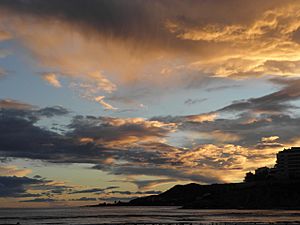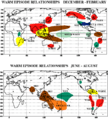Climatology facts for kids
Climatology, also known as climate science, is the study of Earth's climate. Climate is the average weather conditions over a long period, usually 30 years or more. This field of study is part of the Earth sciences. It is closely linked to atmospheric sciences and physical geography. Climatology also includes parts of oceanography (the study of oceans) and biogeochemistry (the study of how living things affect Earth's systems). Knowing about climate can even help with shorter-term weather forecasting.
Contents
What is the Difference Between Climate and Weather?
Climatology is different from meteorology. Meteorology focuses on short-term weather systems. These systems usually last only a few weeks. Climatology, however, studies how often these weather systems happen. It also looks at how they change over many years, even thousands of years.
Climatologists study the nature of climates. This includes local, regional, or global climates. They also look at what causes climates to change. These changes can be natural or caused by humans. Climatology helps us understand the past climate. It can also help us predict future climate change.
A Brief History of Climate Science
People have been observing climate for a long time.
- A Chinese scientist named Shen Kuo (1031–1095) thought that climates change naturally over huge amounts of time. He noticed this after finding petrified bamboo underground. This was near Yanzhou, an area that is now very dry. Bamboo usually needs a wet climate to grow.
- Early climate researchers include Edmund Halley. He published a map of trade winds in 1686. He made this map after a trip to the southern part of the world.
- Benjamin Franklin (1706–1790) was the first to map the path of the Gulf Stream. This map helped send mail faster from the United States to Europe.
Images for kids
-
Köppen-Geiger climate classification (1980-2016). This map shows different climate zones around the world.
See also
 In Spanish: Climatología para niños
In Spanish: Climatología para niños





